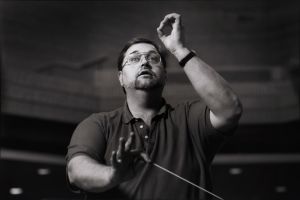Concert Review: Coro Allegro Performs an Ambitious Program of Stirring “Twentieth-Century Voices”
Coro Allegro successfully delivered the joy, grief, and nostalgia inherent in each of these complex vocal works.
By Melanie O’Neill
In celebration of David Hodgkins’s twentieth anniversary as artistic director, Coro Allegro presented a program of twentieth-century choral gems on November 18th in Boston’s Church of the Covenant. The concert featured both sacred and secular works in English, French, and Latin. Although seemingly diverse, all four pieces were written during or in response to the Second World War; some drew on the devastation of war, while others drew on the joy of peace.
With conflicting meters and frequent dissonances that pitch the choir and organ against one another, Benjamin Britten evokes the turmoil of war in the opening bars of his Festival Te Deum. The choir’s sound resonated well in the sizable Church of the Covenant, and their initial homophonic vocal passages were satisfyingly luscious. The energetic leaps of the contrasting middle section were executed with precision, but the music then quickly took a somber turn. Soloist Megan Weireter began hesitantly but steadied herself quickly. Her clean tone and lack of vibrato brought purity to the religious text and closed the piece on a pensive note.
The choir’s French diction was in fine form for Poulenc’s Huit Chansons Francaises. These eight rustic melodies are a tribute to the French folk tradition, which was suppressed during the war. The eight songs alternated between melodious love songs and upbeat, comically inventive tunes that described the “clic, clac” and “tipe et tape” of everyday life. The choir captured the humor of the upbeat songs, but the melodic lines were often overpowered by the accompanying sections. The group fared much better with the love songs, particularly “C’est la petit’ fill’ du prince.” The verses, which were quite simple melodically, generate their captivating pull through a chromatically falling and rising bass line. The choir filled in this humble texture with full, plush harmonies during the surging refrains. Hodgkins coaxed supple phrasings and vocal balance out of these melancholy pieces.
Despite being the most overtly modern piece on the program, Pinkham’s Christmas Cantata also draws heavily on early music for inspiration. Orchestrated for choir, organ, and a brass ensemble of two trumpets and two trombones, the ensemble had quite a variety of tone colors at its disposal. The Allegro movement adhered most strictly to a traditional approach. The brass projected a regal, well-articulated sound while the choir sang opulently in homophonic harmony. Pinkham’s Adagio creates a distinctively mystifying atmosphere. The organ and brass performed with an impressive subtlety while the choir contributed modal melismas that gave the movement its serene, yet somber air. The captivating phrases were sung with an impeccable uniformity of sound and fluidity.
The second half of the program was dedicated entirely to Kodaly’s Missa Brevis. Kodaly retains the standard Latin Mass Ordinary, but sets it to music filled with a raw and expressive power. Kodaly’s Mass is as fickle as human emotion, ready (almost eager) to change tonality on any given note, but despite the composition’s difficulty the choir exuded assurance and displayed proficiency on all fronts. They shifted seamlessly between tonalities, maintained unity through some of Kodaly’s more contrapuntally complex sections, and supported a full-bodied sound through the four octave range of the Mass. Kodaly takes nimble advantage of the lower bass range to drive home the grave moments of the Credo, but he also employs a soprano trio as a bright contrast. The high tessitura of the soprano trio stands out so noticeably in the piece that the voices take on an angelic quality. Sopranos Cheryl Miller, Ana Christina Deschamps, and Nancy McGhee captured the bittersweet nature of the supplication “Christe, eleison,” which is echoed with a sighing “eleison” from the choir.
All four of these twentieth-century composers combine early form with twentieth-century harmony and style. Coro Allegro successfully delivered the joy, grief, and nostalgia inherent in each of these complex works. Organist Susan DeSelms deserves special commendation for her expressive and precise accompaniment in three of the program’s four works. Hodgkins’ connection with the vocalists is apparent, the power he draws from both them and the music is a pleasure to hear.



My first Coro concert and certainly will not be my last. An amazing group. I was pleasantly surprised at the age range of the singers.
Looking forward to their next concert in April!